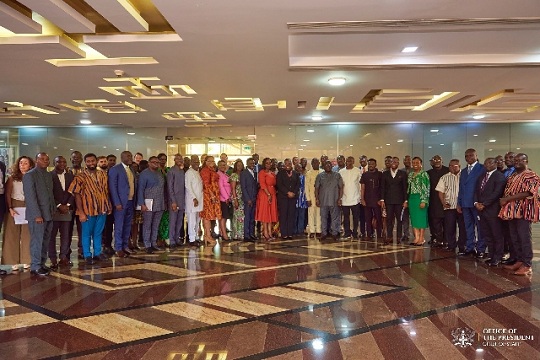Chief of Staff Julius Debrah has inaugurated a working group tasked with developing Ghana’s second National Anti-Corruption Strategy, positioning the initiative as a key pillar in President John Dramani Mahama’s legacy term.
Speaking at the inauguration ceremony, he announced that the new strategy will be coordinated from the Office of the Presidential Advisor, National Anti-Corruption Programme (PANACP), marking a shift in institutional leadership from the previous National Anti-Corruption Action Plan (NACAP).
“Accountability and the fight against corruption constitute a key pillar in the legacy term of H.E John Dramani Mahama. It is worth noting that the previous National Anti-Corruption Action Plan (NACAP) was passed in Parliament in 2014 under the Leadership of H.E. President John Dramani Mahama.
“Destiny has, once again, bestowed on him the responsibility of shepherding the development of the second national anti-corruption strategy,” he stated
The working group has been given a clear mandate to deliver an initial draft of the new National Anti-Corruption Strategy by August 31, 2025.
“I can assure you that the Government will make the necessary arrangements to provide resources for the team to deliver on its mandate. However, we also expect prudence from the team, as you are all aware of the current financial difficulty facing the country,” the Chief of Staff explained.
The new coordination structure through PANACP represents a departure from the previous approach, with enhanced presidential oversight designed to ensure effective implementation.
The Office of the Presidential Advisor will work closely with the Chief of Staff’s office through the Deputy Chief of Staff (Administration) to track progress and ensure the programme delivers on its mandate.
Debrah expressed confidence in the technical expertise of the assembled team, stating that the government expects nothing less than their fullest commitment to the cause.
The working group’s appointment comes as Ghana seeks to address corruption challenges that have persisted despite previous efforts.
The development of Ghana’s second National Anti-Corruption Strategy reflects the administration’s renewed focus on governance and accountability issues.
The initiative builds on the foundation laid by the previous NACAP while incorporating lessons learned from its implementation over the past decade.
The Chief of Staff thanked the Commission on Human Rights and Administrative Justice (CHRAJ) for coordinating Ghana’s foremost anti-corruption plan in the last decade and assured continued collaboration in promoting human rights and administrative justice in Ghana and beyond.





